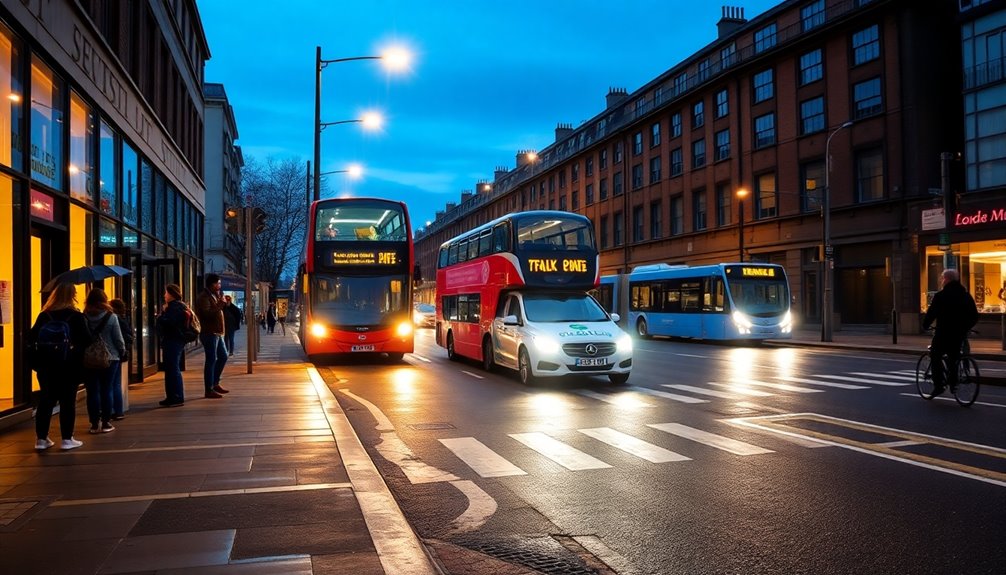
You’ll find practical evening English classes across Dublin that fit work schedules, with good public transport and lively neighbourhoods like Rathmines, Temple Bar and Dublin 2. Courses range from conversation and exam prep to one-to-one tuition and blended options, usually after a placement test. Expect 6–12 week modules, affordable shared housing nearby, and student supports for visas and safety. Keep going for specifics on prices, timetables and travel tips.
Highlights
- Evening English classes in Dublin typically run weekday evenings, with placement tests to match you to the correct level.
- Options include conversation practice, exam prep (IELTS/Cambridge), intensive workshops, and one-to-one tuition.
- Choose neighbourhoods like Dublin 2, Ranelagh, Rathmines, or Portobello for good transport and student amenities.
- Use LUAS, buses, and night services; plan routes with real-time apps and stick to well-lit, busy stops for safety.
- Bring passport, correct visa/stamp, proof of address, and register with your school for student support services.
Why Choose Dublin for Evening English Classes?
Although Dublin’s lively streets and rich literary history make it an inspiring place to study, you’ll also find practical benefits for evening English classes: accessible public transport, a wide range of course providers, and plenty of cafés and libraries where you can practice after class. You’ll appreciate how cultural immersion isn’t just a buzzword here — it’s woven into daily life, from pub conversation nights to museum late openings. Evening schedules let you keep daytime freedom for work or exploration, while language exchange meetups help you build confidence fast. Classes tend to be flexible and focused on real communication, so you can shape learning to your goals. If you want autonomy and authentic practice, Dublin’s evening scene gives you both structure and space to roam.
Which Neighbourhoods Are Best for Students Attending Night Courses?
If you’ve decided evening classes fit your routine, choosing the right neighbourhood can make getting to lessons, studying afterward, and socialising much easier. Look for areas with reliable transport links like Dublin 2 and 4 — these are among the best neighbourhoods for quick commutes and late trains. If you want a livelier scene, consider Temple Bar or Rathmines where cafes and pubs stay open for study or conversation. For quieter focus, Portobello or Ranelagh offer calm streets and cosy libraries. Prioritise student amenities: 24-hour transport, study-friendly cafes, gyms, and affordable eateries. Consider walking distance to your school so you’re not tied to timetables. Pick a neighbourhood that supports your freedom to learn, relax, and explore at your own pace.
What Types of Evening English Programmes Are Available in the City?
When you’re balancing work or daytime commitments, Dublin’s evening English programmes give you flexible options—from casual conversation classes and exam-focused courses (IELTS, Cambridge) to intensive evening intensive skills workshops and one-to-one tuition tailored to your goals. You can pick compact weekly classes that focus on speaking and listening, blended courses mixing online study with in-person evenings, or block-format evening course formats that concentrate on grammar, pronunciation, or business English. If you want social practice, many providers host language exchange opportunities, conversation clubs, and tandem schemes so you’re free to practise with locals and other learners. Evening timetables often run from twice-weekly sessions to concentrated short courses, so you can choose what fits your schedule and ambitions.
How Do Course Levels and Placement Tests Work for Evening Classes?

Because classes need to match your current skills to help you progress, most evening programmes start with a placement test and a short interview or written sample to determine level. You’ll get a clear course assessment that maps your strengths and gaps to standard levels (A1–C2 or similar). Tests focus on reading, writing, speaking and listening so your language proficiency is accurately measured. After placement, you’ll join a class that fits your pace, with teachers adjusting tasks so you keep improving without feeling boxed in. You can request reassessment if you advance quickly. This flexible, transparent approach lets you plan study around life, choose targeted modules, and stay in control of your learning path while building practical English skills.
What Is the Typical Schedule and Duration of Evening Lessons?
Although evening courses vary, they’re usually scheduled to fit around work or study, with classes running two to three times a week for 1.5–3 hours per session. You’ll find options that let you pick compact intensive blocks or a steadier, longer-term pace so you can keep evenings free when needed. Schools often offer beginner to advanced streams, and each session follows a clear lesson structure: warm-up, focused skills practice (listening, speaking, reading, writing), and review or homework guidance. If you value evening flexibility, look for modular timetables and drop-in-friendly policies. That way, you control commitment levels and blend learning with your lifestyle without sacrificing progress or structure.
How Much Do Evening English Courses Usually Cost in Dublin?
Now that you know how evening lessons are structured and scheduled, it helps to look at what they cost so you can budget and compare options. Prices vary: short casual courses or drop-in conversation classes can be around €80–€150 for a month, while structured multi-week intensive evening courses commonly run €200–€600 depending on hours and level. Private tuition is pricier, often €30–€60 per hour. Look for schools that list clear course pricing on their sites so you can pick what fits your lifestyle. Ask about payment options — pay-as-you-go, monthly plans, or upfront discounts — and check for hidden fees like materials or registration. That way you keep choices flexible and costs transparent.
What Public Transport and Safety Tips Apply to Students Attending Night Classes?

When you attend evening English classes in Dublin, you’ll want to know the best public transport options — buses, trams (Luas) and short taxi routes — that run late. Plan safe routes to and from the stop, stick to well-lit streets, and keep your phone charged and visible only when needed. Also check late-night timetables or arrange a reliable after-class travel plan so you won’t be left waiting alone.
Public Transport Options
If you’re heading to evening English classes in Dublin, getting there and home safely is straightforward thanks to frequent buses, trams (LUAS) and commuter trains (DART and commuter lines) that serve the city centre and suburbs. You’ll find multiple bus routes stopping near colleges and language schools; check real-time apps for delays and the best route. Tram services cover key corridors, ideal if you value speed and predictability. Tickets are flexible — pay-as-you-go Leap cards, single fares or short-term visitor passes — so you’re free to change plans. Night buses and later tram departures cover many areas; confirm times on the transport site before you leave. Plan your journey, keep essentials handy, and enjoy the independence of getting around Dublin for your classes.
Safety on Routes
Having a reliable route is one thing, but feeling safe on that route matters just as much, especially after dark. When you choose evening classes, do basic route planning: pick well-lit stops, busier lines and paths with frequent services. Share your plan with a friend or classmate and set check-in times so someone knows when you’ve arrived. Keep your phone charged, use official transport apps for real-time updates, and avoid empty stations or shortcuts through poorly lit areas. Stay aware of your surroundings, keep valuables concealed, and trust your instincts—if something feels off, move toward staff or a busy area. These practical safety tips help you keep independence while reducing risk on your way to class.
After-Class Travel
Because your return trip matters as much as your journey there, plan which public transport you’ll take home and how you’ll stay safe on it. Check Dublin Bus, Luas, and DART timetables so you won’t be stranded after class; apps let you track real-time departures and choose routes that match evening after class activities. Stick to well-lit stops, sit near the driver or other passengers, and keep belongings close. If you’re exploring local attractions after class, map your walking route and share ETA with a friend. Consider a taxi or rideshare for late finishes, and use official stands or licensed drivers. Trust your instincts — if something feels off, move to a populated area or call campus security.
Where Can Students Find Affordable Housing and Study-Friendly Cafés Near Evening Schools?
Where can you find affordable housing and quiet cafés near Dublin’s evening schools? You’ll want to scout neighbourhoods like Smithfield, Phibsborough, and Rathmines for affordable housing options — shared flats and student rooms keep costs down and give you independence. Look near tram and bus routes to cut commute time so evenings feel yours. For study time, hunt out study friendly cafés in Portobello, Stoneybatter, and around Dublin 2: many open late, have reliable Wi‑Fi, and welcome laptops without fuss. Mix short-term rentals while you test areas, then settle where vibes match your rhythm. Use local Facebook groups, student housing boards, and café reviews to find spots that balance price, peace, and freedom.
What Documentation and Student Supports Are Needed for International Learners?
If you’re planning to study in Dublin, you’ll need a clear set of documents and supports to settle in smoothly: think a valid passport, the correct visa or stamp for your course length, proof of address for Garda registration, and evidence of funds or tuition payment. Beyond paperwork, gather copies of academic transcripts, English test results, health insurance, and emergency contacts. Register with your school so they can confirm your status for immigration. Use international student documentation to access banking, SIM cards, and transit passes. Seek learner support services for orientation, language help, counselling, and housing advice — they’ll help you stay independent and safe. Keep digital and physical copies of all documents and a plan for renewals.
Some Questions Answered
Can I Bring a Partner or Spouse to Accompany Me to Class Evenings?
You can usually bring a partner, but it depends on partner participation rules and class policies; check beforehand, since spaces and lesson flow matter, and the school might limit guests to protect other students’ learning freedom and focus.
Are There Discounts for Booking Multiple Evening Courses at Once?
Yes — like buying maps for many voyages, you’ll get course package discounts and group booking offers when enrolling multiple evening courses. You’ll save money, keep flexibility, and still choose the paths that let you roam free.
Do Schools Offer Evening Classes Specifically for Shift Workers?
Yes — many schools offer evening class schedules tailored for shift worker flexibility, so you can pick rotating or flexible sessions that fit unpredictable hours, letting you study when free without sacrificing work or personal freedom.
Can Employers Pay for My Evening English Course Tax-Free?
I checked — yes, employers can often pay tax-free if it’s work-related; like a colleague who got employer reimbursement for a certification, you’ll need to confirm course eligibility and meet HMRC or Revenue rules to qualify.
Are Pets Allowed on School Premises During Evening Sessions?
No, pets aren’t allowed during evening sessions; you’ll need to follow school regulations and pet policies for safety and allergies. If you crave freedom, ask about designated outdoor areas or exceptions before attending.
Summing Everything Up
You’ll find evening English classes in Dublin can fit your life — and sometimes life fits them back. You might bump into a classmate on the Luas, discover a café that becomes your study corner, or realise the neighbourhood you choose shapes your experience more than the timetable. These small coincidences remind you that learning isn’t just scheduled lessons; it’s the unexpected connections and places that turn study into belonging. Keep an open route home.
